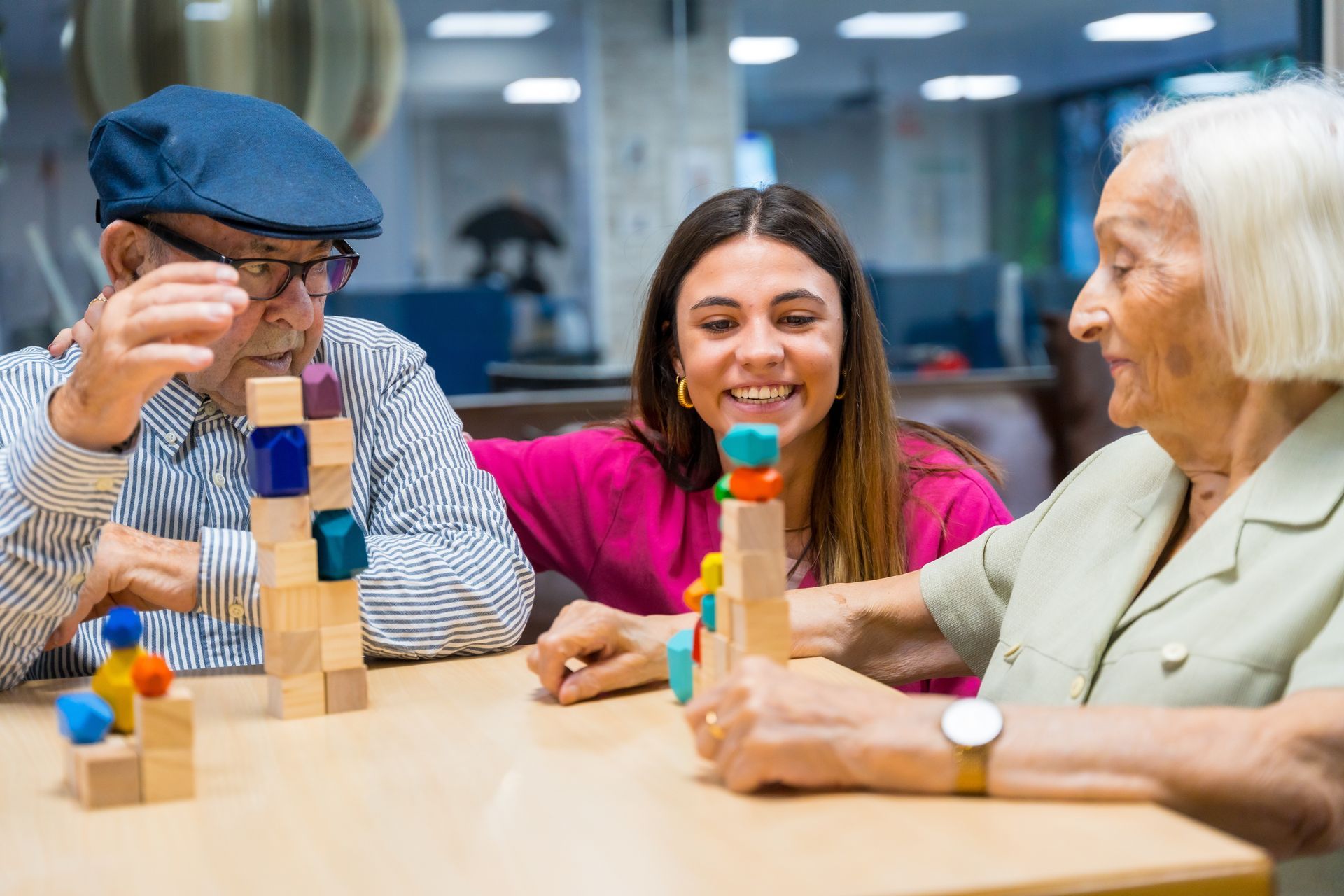BLOG
Creating Innovative and Supportive Care Plans for Dementia
In the world of memory care and assisted living, the impact of communal living spaces on care plans for dementia is a critical consideration. Today, we look at the influence of communal living environments on the well-being of individuals with dementia and the development of supportive care plans. From examining evidence-based approaches to embracing future trends, we uncover the pivotal role of communal living spaces in tailoring personalized care plans for those with dementia.
Exploring Evidence-based Approaches in Tailoring Care Plans
Evidence-based approaches play a pivotal role in tailoring personalized care plans to meet the distinctive needs of individuals. By looking at specific research findings and data-backed strategies, dementia care plans are continually evolving and adapting to best serve those with cognitive impairments. Let's explore the latest evidence-based methods that are revolutionizing the approach to dementia care planning.

Research Findings
Research indicates that personalized activities, such as music therapy and reminiscence therapy, have shown significant positive impacts on the cognitive and emotional well-being of individuals with dementia. These findings are instrumental in crafting tailored care plans that prioritize activities aligned with the individual's preferences and abilities.
Furthermore, studies have highlighted the effectiveness of environmental modifications, including the use of color contrast and clear signage, in reducing confusion and enhancing independence for individuals with dementia. This evidence underscores the importance of environmental considerations in the development of personalized care plans that support the daily lives of those with cognitive challenges.
Data-Backed Strategies
Data-driven approaches, such as incorporating regular cognitive assessments and individualized care goal setting, are fundamental in shaping effective care plans for dementia. These strategies enable care providers to track cognitive changes and adapt interventions accordingly, ensuring that the care plans remain responsive to the evolving needs of the individual.
Additionally, evidence-based interventions, such as sensory stimulation programs and tailored social engagement activities, have demonstrated significant improvements in the quality of life for individuals with dementia. By integrating these strategies into care plans, a holistic approach to addressing cognitive, emotional, and social well-being is achieved, emphasizing the individual's overall quality of life.
As we navigate evidence-based approaches in dementia care planning, it becomes evident that the combination of research findings and data-backed strategies is instrumental in tailoring care plans that honor the uniqueness of each individual living with dementia.
The Influence of Communal Living Spaces
In the context of dementia care, communal living spaces wield a profound influence on the well-being of individuals with cognitive challenges, contributing significantly to the development of supportive care plans tailored to their unique needs. Let's look at some of the distinctive advantages of communal living environments and their pivotal role in enhancing the overall quality of dementia care.
Benefits of Communal Living Environments
- Social Engagement and Connection: Communal living spaces foster a sense of community and social interaction among residents, mitigating feelings of isolation commonly experienced by individuals with dementia. This social connectivity cultivates a supportive network, promoting emotional well-being and reducing the sense of loneliness often associated with cognitive impairments.
- Promotion of Independence and Autonomy: The design of communal living environments encourages independence while providing a safety net of support. Residents have the opportunity to engage in daily routines and communal activities, fostering a sense of purpose and autonomy within a secure and nurturing setting.
Role in Enhancing Dementia Care
Communal living spaces facilitate a holistic approach to dementia care, integrating social, emotional, and cognitive stimulation within the daily living environment. This holistic approach is instrumental in the development of care plans that prioritize the individual's overall well-being, going beyond mere medical assistance to encompass a comprehensive support system.
The communal setting allows individuals with dementia to participate in familiar daily routines and activities, such as shared meals and recreational programs, promoting a sense of normalcy and continuity in their lives. This normalization contributes to the development of personalized care plans that align with the individual's accustomed lifestyle and preferences.
As we explore the impact of communal living spaces on dementia care plans, it becomes evident that these environments play a vital role in fostering a supportive and enriching atmosphere for individuals with cognitive impairments, ultimately shaping care plans that prioritize their well-being and quality of life.
Navigating Personalized Care Plans: Key Considerations for Families and Caregivers
When it comes to personalized care plans for individuals with dementia, families and caregivers play a pivotal role in navigating the complexities of the care planning process. Empowering them with specific considerations and practical insights is essential to ensure the development and implementation of effective care plans that cater to the unique needs of their loved ones.

Understanding the Individual's Preferences and History
Encouraging families and caregivers to provide insights into the individual's past preferences, hobbies, and routines enables the care team to tailor activities and interventions that resonate with the person's familiar experiences, promoting comfort and a sense of continuity.
Emphasizing the importance of open communication between families, caregivers, and the care team can facilitate a deeper understanding of the individual's communication style and personal history, fostering a collaborative approach to care planning that aligns with the person's unique needs and preferences.
Collaboration and Support Networks
Guiding families and caregivers to seek professional guidance and support from memory care specialists and healthcare professionals can provide invaluable resources and expertise in navigating the complexities of dementia care planning, ensuring that the care plans are comprehensive and responsive to the individual's evolving needs.
Encouraging families and caregivers to connect with support groups and organizations focused on dementia care can foster a sense of community and shared experiences, offering emotional support and practical insights that empower them in their caregiving journey.
As families and caregivers navigate the intricacies of personalized care plans for individuals with dementia, fostering a collaborative and informed approach is instrumental in developing effective care strategies that honor the individual's dignity and enhance their overall quality of life.
Embracing Innovation: Future Trends in Dementia Care Planning
As the field of dementia care continues to evolve, embracing innovation is essential in shaping the future of care planning for individuals with cognitive impairments. Exploring emerging trends and technological advancements, such as AI, IoT, and other innovative solutions, provides insights into how these developments are reshaping dementia care and offering new possibilities for personalized care plans.

Potential Impact of AI and IoT
The integration of AI and IoT technologies enables the development of smart monitoring systems that can track daily activities, detect anomalies, and provide real-time insights into the well-being of individuals with dementia. These systems offer valuable data for care planning, facilitating personalized interventions based on the individual's routines and behavior patterns.
AI-driven assistive devices, coupled with IoT connectivity, have the potential to enhance safety and independence for individuals with dementia. From smart home adaptations to wearable devices, these innovations can contribute to the development of care plans that prioritize the individual's autonomy while ensuring their well-being.
Reshaping the Landscape of Dementia Care
- Personalized Intervention Strategies: The use of AI in analyzing cognitive patterns and behavioral trends can inform the development of personalized intervention strategies, tailoring care plans to address specific challenges and support the individual's cognitive and emotional well-being.
- Predictive Analytics: Leveraging AI for predictive analytics offers the opportunity to anticipate changes in the individual's condition, enabling proactive adjustments to care plans and interventions that align with the person's evolving needs, ultimately enhancing the effectiveness of dementia care strategies.
By embracing innovative technologies and exploring future trends in dementia care planning, the potential impact of AI, IoT, and other advancements offers promising avenues for the development of personalized care plans that prioritize the well-being and quality of life for individuals living with dementia.
The integration of communal living spaces, evidence-based approaches, and innovative technologies in dementia care planning yields a transformative impact on the well-being and quality of life for individuals with cognitive impairments. As communal living environments foster social engagement, independence, and normalization of daily routines, they play a pivotal role in shaping supportive care plans tailored to the individual's unique needs.
Furthermore, evidence-based methods and data-backed strategies provide a solid foundation for personalized care plans, emphasizing holistic well-being and individual preferences. Embracing innovative trends, including AI and IoT, holds the promise of reshaping dementia care. All of these elements can be brought together to redefine the approach to dementia care planning, prioritizing dignity, autonomy, and enriched experiences for those living with cognitive challenges.
Visit Assured Senior Living for more information on dementia care and personalized care plans.
At Assured Senior Living, we invite you to learn more about our exceptional communities. Contact us today, or download our free Family Decision Toolkit guide for more information.
Sources
Applications and Outcomes of Internet of Things for Patients with Alzheimer's Disease/Dementia: A Scoping Review - https://www.ncbi.nlm.nih.gov/pmc/articles/PMC8948545/
Combining pathological and cognitive tests scores: A novel data analytics process to improve dementia prediction models1 - https://pubmed.ncbi.nlm.nih.gov/38339943/















